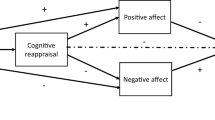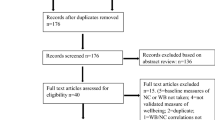Abstract
Many studies support the beneficial effects of the “four immeasurable meditations” (FIM) that originate from Buddhism, but most psychological interventions adopt FIM that cultivate loving-kindness and compassion. The current study developed and evaluated a 4-week training program named “Heart of Joy” (HOJ) that is based on FIM that cultivate appreciative joy. Participants were randomly assigned to HOJ training (n = 59) or a wait-list condition (n = 42), and the final sample consisted of 41 participants in each condition. Satisfaction with life, appreciative joy, envy, emotions, and attitudes toward oneself and others were measured at pre-training, at post-training, and at a 1-month follow-up. The time × condition (M)ANOVA showed that HOJ participants had significantly higher low-arousal positive emotions and lower high-arousal and low-arousal negative emotions at both the post-training and follow-up assessments, as well as higher medium-arousal positive emotions at the post-training assessment only. HOJ participants also reported significantly higher life satisfaction at both the post-training and follow-up assessments and significantly lower envy at the follow-up assessment. The results had a medium effect size (Cohen’s d values ranging from 0.52 to 0.69). Appreciative joy, all attitudes, high-arousal positive emotions, and medium-arousal negative emotions did not show significant results. Further investigations revealed that changes in appreciative joy were more closely associated with changes in high-arousal than low-arousal positive emotions, and changes in envy were more closely associated with changes in attitudes toward oneself than attitudes toward others; this outcome indicates that appreciative joy and envy were impacted during this intervention. This study suggests that HOJ is a promising training program to improve subjective well-being and envy, and the implications for research were discussed.

Similar content being viewed by others
References
Arch, J. J., Landy, L. N., & Brown, K. W. (2016). Predictors and moderators of biopsychological social stress responses following brief self-compassion meditation training. Psychoneuroendocrinology, 69, 35–40.
Bluth, K., Gaylord, S. A., Campo, R. A., Mullarkey, M. C., & Hobbs, L. (2016). Making friends with yourself: A mixed methods pilot study of a mindful self-compassion program for adolescents. Mindfulness, 7(2), 479–492.
Condon, P., Desbordes, G., Miller, W. B., & DeSteno, D. (2013). Meditation increases compassionate responses to suffering. Psychological Science, 24(10), 2125–2127.
Diener, E. D., Emmons, R. A., Larsen, R. J., & Griffin, S. (1985). The satisfaction with life scale. Journal of Personality Assessment, 49(1), 71–75.
Diener, E., Oishi, S., & Lucas, R. E. (2003). Personality, culture, and subjective well-being: Emotional and cognitive evaluations of life. Annual Review of Psychology, 54(1), 403–425.
Fredrickson, B. L., Cohn, M. A., Coffey, K. A., Pek, J., & Finkel, S. M. (2008). Open hearts build lives: Positive emotions, induced through loving-kindness meditation, build consequential personal resources. Journal of Personality and Social Psychology, 95(5), 1045–1062.
Galante, J., Galante, I., Bekkers, M. J., & Gallacher, J. (2014). Effect of kindness-based meditation on health and well-being: A systematic review and meta-analysis. Journal of Consulting and Clinical Psychology, 82(6), 1101–1114.
Galante, J., Bekkers, M. J., Mitchell, C., & Gallacher, J. (2016). Loving-kindness meditation effects on well-being and altruism: A mixed-methods online RCT. Applied Psychology: Health and Well–Being, 8(3), 322–350.
Graser, J., Höfling, V., Weßlau, C., Mendes, A., & Stangier, U. (2016). Effects of a 12-week mindfulness, compassion, and loving kindness program on chronic depression: A pilot within-subjects wait-list controlled trial. Journal of Cognitive Psychotherapy, 30(1), 35–49.
Guo, R., O-Yang, Y., Deng, Y., Feng, S., He, W., & Liu, H. (2013). Reliability and validity of the Chinese version of dispositional envy scale in Chinese college students. Chinese Journal of Health Psychology, 121(5), 701–703.
Kearney, D. J., McManus, C., Malte, C. A., Martinez, M. E., Felleman, B., & Simpson, T. L. (2014). Loving-kindness meditation and the broaden-and-build theory of positive emotions among veterans with posttraumatic stress disorder. Medical Care, 52, S32–S38.
Kok, B. E., Coffey, K. A., Cohn, M. A., Catalino, L. I., Vacharkulksemsuk, T., Algoe, S. B., et al. (2013). How positive emotions build physical health perceived positive social connections account for the upward spiral between positive emotions and vagal tone. Psychological Science, 24(7), 1123–1132.
Koopmann-Holm, B., Sze, J., Ochs, C., & Tsai, J. L. (2013). Buddhist-inspired meditation increases the value of calm. Emotion, 13(3), 497–505.
Kraus, S., & Sears, S. (2009). Measuring the immeasurables: Development and initial validation of the self-other four Immeasurables (SOFI) scale based on Buddhist teachings on loving kindness, compassion, joy, and equanimity. Social Indicators Research, 92(1), 169–181.
Lee, Y. C., Lin, Y. C., Huang, C. L., & Fredrickson, B. L. (2013). The construct and measurement of peace of mind. Journal of Happiness Studies, 14(2), 571–590.
Leiberg, S., Klimecki, O., & Singer, T. (2011). Short-term compassion training increases prosocial behavior in a newly developed prosocial game. PLoS One, 6(3), e17798.
Lumma, A. L., Kok, B. E., & Singer, T. (2015). Is meditation always relaxing? Investigating heart rate, heart rate variability, experienced effort and likeability during training of three types of meditation. International Journal of Psychophysiology, 97(1), 38–45.
Neff, K. D., & Germer, C. K. (2013). A pilot study and randomized controlled trial of the mindful self-compassion program. Journal of Clinical Psychology, 69(1), 28–44.
Orellana-Rios, C. L., Radbruch, L., Kern, M., Regel, Y. U., Anton, A., Sinclair, S., & Schmidt, S. (2018). Mindfulness and compassion-oriented practices at work reduce distress and enhance self-care of palliative care teams: A mixed-method evaluation of an “on the job” program. BMC Palliative Care. https://doi.org/10.1186/s12904-017-0219-7.
Shahar, B., Szsepsenwol, O., Zilcha-Mano, S., Haim, N., Zamir, O., Levi-Yeshuvi, S., & Levit-Binnun, N. (2015). A wait-list randomized controlled trial of loving-kindness meditation programme for self-criticism. Clinical Psychology & Psychotherapy, 22(4), 346–356.
Shonin, E., Van Gordon, W., Compare, A., Zangeneh, M., & Griffiths, M. D. (2015). Buddhist-derived loving-kindness and compassion meditation for the treatment of psychopathology: A systematic review. Mindfulness, 6(5), 1161–1180.
Smith, R. H., & Kim, S. H. (2007). Comprehending envy. Psychological Bulletin, 133(1), 46–64.
Smith, R. H., Parrott, W. G., Diener, E. F., Hoyle, R. H., & Kim, S. H. (1999). Dispositional envy. Personality and Social Psychology Bulletin, 25(8), 1007–1020.
Sujiva, V. (2007). Loving-kindness meditation. Available from http://enlight.lib.ntu.edu.tw/FULLTEXT/JR-MAG/mag140106.pdf.
Uchino, B. N., Bowen, K., de Grey, R. G. K., Smith, T. W., Baucom, B. R., Light, K. C., & Ray, S. (2016). Loving-kindness meditation improves relationship negativity and psychological well-being: A pilot study. Psychology, 7(01), 6–11.
Wallmark, E., Safarzadeh, K., Daukantaitė, D., & Maddux, R. E. (2013). Promoting altruism through meditation: An 8-week randomized controlled pilot study. Mindfulness, 4(3), 223–234.
Weng, H. Y., Fox, A. S., Shackman, A. J., Stodola, D. E., Caldwell, J. Z., Olson, M. C., et al. (2013). Compassion training alters altruism and neural responses to suffering. Psychological Science, 24(7), 1171–1180.
Weytens, F., Luminet, O., Verhofstadt, L. L., & Mikolajczak, M. (2014). An integrative theory-driven positive emotion regulation intervention. PLoS One, 9(4), e95677.
Zeng, X., Liu, S., & Liu, X. (2013). The application and empirical studies on loving-kindness meditation from psychological perspective. Advances in Psychological Science, 21(8), 1466–1472.
Zeng, X., Chiu, C., Wang, R., Oei, T., & Leung, F. (2015a). The effect of loving-kindness meditation on positive emotions: A meta-analytic review. Frontiers in Psychology. https://doi.org/10.3389/fpsyg.2015.01693.
Zeng, X., Li, M., Zhang, B., & Liu, X. (2015b). Revision of the Philadelphia mindfulness scale for measuring awareness and equanimity in Goenka’s Vipassana meditation with Chinese Buddhists. Journal of Religion and Health, 54(2), 623–637.
Zeng, X., Chan, V. Y., Liu, X., Oei, T. P., & Leung, F. Y. (2017a). The four immeasurables meditations: Differential effects of appreciative joy and compassion meditations on emotions. Mindfulness. https://doi.org/10.1007/s12671-016-0671-0.
Zeng, X., Chan, V. Y., Oei, T. P., Leung, F. Y., & Liu, X. (2017b). Appreciative joy in Buddhism and positive empathy in psychology: How do they differ? Mindfulness. https://doi.org/10.1007/s12671-017-0690-5.
Zeng, X., Chio, F. H., Oei, T. P., Leung, F. Y., & Liu, X. (2017c). A systematic review of associations between amount of meditation practice and outcomes in interventions using the four Immeasurables meditations. Frontiers in Psychology. https://doi.org/10.3389/fpsyg.2017.00141.
Zeng, X., Liao, R., Zhang, R., Oei, T. P., Yao, Z., Leung, F. Y., & Liu, X. (2017d). Development of the appreciative joy scale. Mindfulness, 8(2), 286–299.
Acknowledgements
The training program “Heart of Joy” was designed by Xianglong Zeng without financial support from any institution, and the details of training program are available by request from xzeng@bnu.edu.cn. Dr. Oei is now an Emeritus Professor of University of Queensland.
Author information
Authors and Affiliations
Contributions
XZ and FL designed the study, XZ developed the training, XZ and RW collected and analyzed the data, and XZ and TO collaborated in the writing of the paper. All authors discussed the findings and reviewed and commented on the manuscript.
Corresponding author
Ethics declarations
Ethical Approval
All procedures performed in studies involving human participants were in accordance with the ethical standards of the institutional and/or national research committee and with the 1964 Helsinki declaration and its later amendments or comparable ethical standards. The procedures were approved by Survey and Behavioral Research Ethics Committee in the Chinese University of Hong Kong and Shenzhen University. Informed consent was obtained from all individual participants included in the study.
Conflict of Interest
The first author of this article is the developer of the Heart of Joy program.
Electronic Supplementary Material
ESM 1
(DOCX 41 kb)
Rights and permissions
About this article
Cite this article
Zeng, X., Wang, R., Oei, T.P.S. et al. Heart of Joy: a Randomized Controlled Trail Evaluating the Effect of an Appreciative Joy Meditation Training on Subjective Well-Being and Attitudes. Mindfulness 10, 506–515 (2019). https://doi.org/10.1007/s12671-018-0992-2
Published:
Issue Date:
DOI: https://doi.org/10.1007/s12671-018-0992-2




